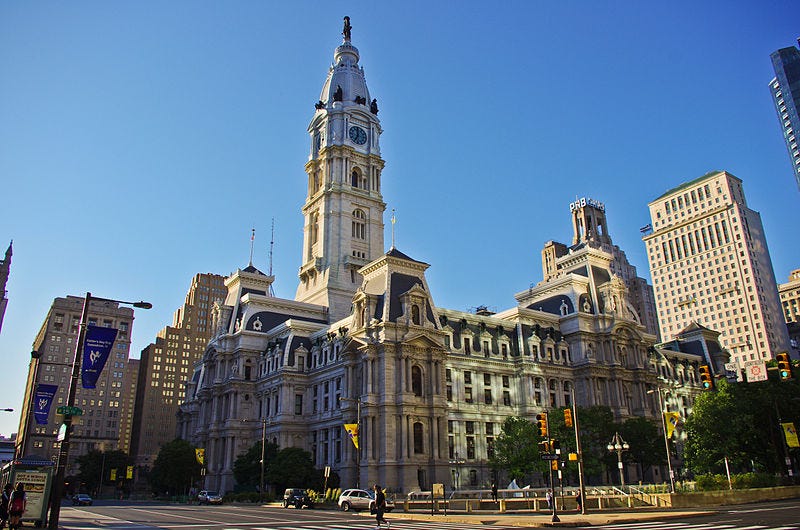
It’s election day in Philadelphia! As this email hits your inbox, voters are heading to the polls to choose who they want as their next (and 100th) mayor.
Technically, this is just the primary. The general election isn’t until November. But Philadelphia is essentially a one-party state (Democratic voter registration outpaces GOP registration 7:1 and Democrats routinely win mayoral elections in landslides) and so whoever comes out on top today is a lock to win the general.
The race is pretty much up for grabs. The only high-quality poll that’s come out in the last week shows a melee of a race without any clear frontrunner. Here’s that poll, with brief descriptions of each of the candidates below it.

Helen Gym (21%) is a former city council member. She’s running as the true progressive in the race and has been endorsed by figures like Bernie Sanders and Alexandria Ocasio-Cortez. Her support comes disproportionately from voters who are younger, progressive, and Hispanic, Asian, or white.
Cherelle Parker (18%) is a former city council member. She’s running as a political insider with connections and skill and knowledge to get things done. She’s also a black woman and has put that front and center in her pitch to voters. Her support skews older and she has by far the most support from black voters and the black political establishment. In contrast to Gym, she’s run a more tough-on-crime campaign.
Rebecca Rhynhart (18%) is a former city controller (a job that involves overseeing the city’s finances and accounting). She’s portrayed herself as a “no nonsense technocrat [with] the support of three former mayors,” according to the Washington Post. Her base is pretty well balanced across demographic groups, but does skew a bit towards younger Hispanic and white voters.
Allan Domb (14%) is a former city council member and a real estate developer. He pulls support from older and whiter voters and has an aggressive plan for curbing crime that contrasts sharply with Gym’s approach.
Jeff Brown (10%) is the owner of a grocery store chain who has worked to open stores in food deserts. He’s the only viable candidate without political experience. His support is spread pretty evenly across demographics.
With 15% of voters undecided and a 3.9% margin of error in the poll, Gym, Parker, Rhynhart, and Domb are effectively tied. Even Brown could still pull this out, though his chances seem considerably dimmer.
To be clear, I’m no expert on Philadelphia politics. In fact, I’ve never even had a chance to visit the city. But from an outsider's perspective, the issue that seems to be dominating this election is the same one that’s been dominating other municipal elections recently: crime and public safety. Yes, voters say they are also concerned about jobs, the economy, housing affordability, and schools, but there is really no competition. Nine in ten Philadelphia say that crime needs to be a “top priority” for the next crop of elected officials.
Today’s election comes on the heels of mayoral elections in Chicago and Los Angeles in which voters were similarly concerned about public safety and crime. There, progressive insurgents managed to overpower their more moderate, police-friendly opponents. I was a bit surprised when that happened. I thought that voters concerned about crime would inevitably opt for a “tough on crime” approach. In the end, that was wrong. And so I was forced to adjust my mental model of how municipal politics works. Voters in cities are clearly more open to the progressive ideas around policing and public safety than I had thought.
Heading into today’s election, the main question on my mind is whether Philadelphia progressives can accomplish something similar to their peers in Chicago. Gym has pushed for decreasing police funding and an approach to crime that’s more focused on poverty and inequality than fighting crime more directly. If progressives can get deliver her the nomination, it’ll indicate that progressive ideas on crime are not as unpopular as many pundits have come to think. If progressives fail to do that, it’ll be a sign that moderates still seem to have the upper hand on public safety, despite their having a few recent losses like the one in Chicago and LA.
Of course, the national press will likely pump up their headlines and conclusions to comical levels. If Gym wins, the story will be a new era of progressive dominance! If Gym loses, it’ll be evidence of a moderate backlash led by minority voters!
My advice is to not buy into these narratives so completely. Democrats have been fiercely debating the question of how to approach the topics of policing and crime since George Floyd’s murder in 2020. One election in Philadelphia isn’t going to put an end to that debate. The media may treat it that way, but you should not.
Instead, I’d suggest approaching this election as an important but not definitive marker of where Democrats are headed on the questions of public safety, policing and crime. That’s undoubtedly going to be an important issue in next year’s national elections, and so even if you’re not particularly interested in Philadelphia, the results of today’s election are still worth keeping an eye on. You can do that at this link starting when polls close at 8:00 pm.
As a substitute for any kind of charge or paywall, I ask free subscribers to do just one thing to help me grow Brain Candy per post.
For this one, here’s my ask: please share Brain Candy with one person who is interested in politics and elections (or with many people, if you can!) 🙏.

